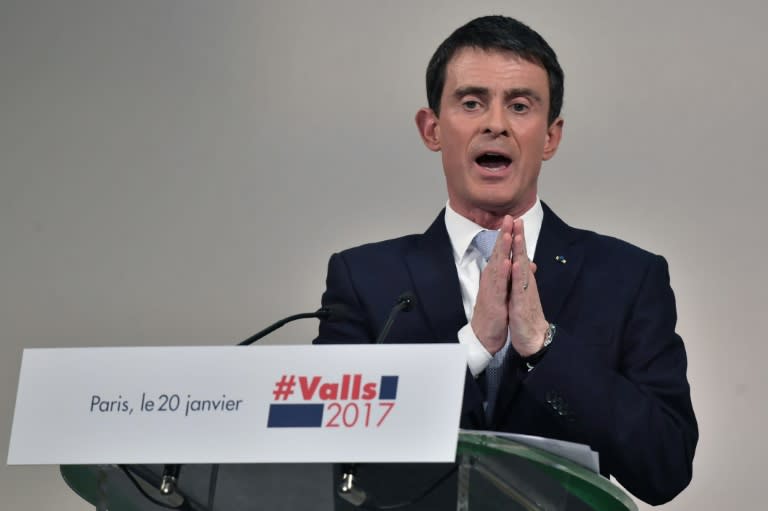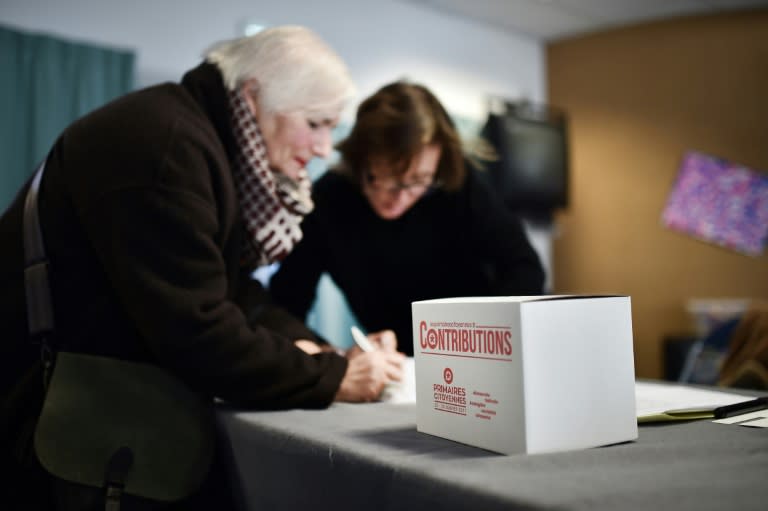Divided French Socialists vote for presidential candidate
Supporters of France's fractured Socialists voted Sunday to choose a presidential candidate with the party in danger of being reduced to also-rans as Europe shifts to the right. The two-round primary is viewed as a crucial test of the Socialists' ability to re-invent themselves, with their outgoing flagbearer President Francois Hollande deeply unpopular after five years in office. The presidential election in April and May is shaping up as a three-way battle between conservative ex-premier Francois Fillon, far-right leader Marine Le Pen and Emmanuel Macron, the 39-year-old former economy minister who is stealing the headlines from his former Socialist government colleagues. Most opinion polls currently show a Fillon-Le Pen runoff as the most likely scenario, with Macron possibly finishing ahead of the Socialist candidate in the first round but both being eliminated. A poll published on Thursday gave Macron between 17 and 21 percent of the first-round vote. Hollande's former prime minister Manuel Valls, who quit the cabinet in December, was the favourite to win the Socialist nomination when the seven candidates began campaigning. But many observers believe he has run a lacklustre campaign and two contenders from the party's left flank -- protectionist maverick Arnaud Montebourg and former education minister Benoit Hamon -- will push him hard to reach next Sunday's runoff. - Eclipsed by Macron - Hamon has performed strongly in the three TV debates of a short campaign, attracting attention with his proposal to pay the poor and 18 to 25-year-olds a "universal income" rising from 600 euros to 750 euros ($640 to $800) a month -- an idea dismissed as ruinously expensive by Montebourg. "I voted for Benoit Hamon because to me he is the one best placed to revive the Socialist party," said Jean Claude, who cast his ballot in Millau, southwestern France. Dominique, a man in his 40s who voted in eastern Paris, said he was backing Valls. "My main concern is that the left reaches the second round (of the presidential election). Valls is the most credible option against Macron," he said. Macron, a relative newcomer to politics who resigned from the government in August to set up his own centrist movement, has drawn large crowds to his campaign events in recent weeks. Turnout in the Socialist primary was around half of that in the centre-right Republicans primary in November. Between 1.7 million and 1.9 million voted, according to an estimate by the Elabe polling group as polling stations closed, compared to four million who took part in the first round of the rightwing primary. The first indication of the results is expected by 2000 GMT. - Tactical voting? - Some Socialist heavyweights have hinted they could support Macron over their party's nominee if he looks to have a better chance of reaching the second round of the presidential election against Le Pen. Le Pen, who leads the anti-immigration National Front (FN), told a meeting of rightwing populist parties in Germany on Saturday that Europe was about to "wake up" following the victory of Donald Trump in the US election and the British vote to leave the European Union. Geert Wilders' far-right party is forecast to perform strongly in March's Dutch general election. Macron himself has ruled out a pact with the Socialists, announcing Thursday that his En Marche movement would field hundreds of candidates in parliamentary elections in June. Communist-backed firebrand Jean-Luc Melenchon, who like Macron is polling in double digits in his campaign as an independent, also risks splitting the leftwing vote. Valls, who was slapped this week by a protester, set out to modernise the party but has struggled to unite his camp, with his rivals accusing him of betraying leftist ideals by forcing through labour market reforms. The four other candidates running in the primary are former education minister Vincent Peillon, ecologist Francois de Rugy, ex-MEP Jean-Luc Bennahmias and radical left candidate Sylvia Pinel.




